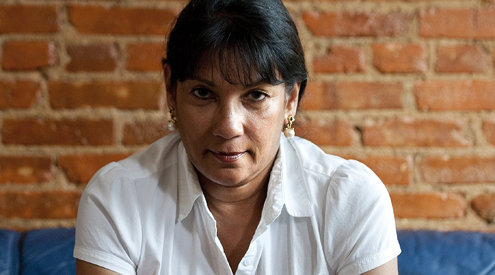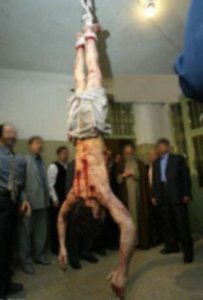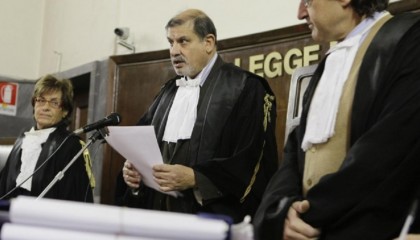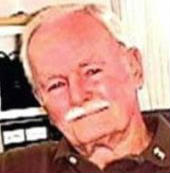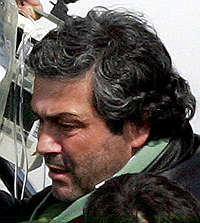| Editor's Comment: In 2001-2 it was Sibel Edmonds, a language specialist for the FBI’s Washington Field Office who discovered and reported serious acts of security breaches, cover-ups, and intentional blocking of intelligence that had national security implications just after 9/11. The FBI retaliated and fired her in March 2002 but Edmonds has continued her work as a whistleblower. Sabrina De Sousa was arrested for her role as a CIA translator in the CIA kidnapping and torture of Egyptian Cleric Hassan Nasr in 2003. She has now joined the ranks of Edmonds, Bradley Manning, Edward Snowden, Shamai Leibowitz, FBI translator, Thomas Drake (NSA), Stephen Kim (US State Department) and Jeffrey Sterling & John Kyriakou (CIA) and others. The criminal activities of the US government are gradually being exposed by these heroic women and men. But Sabrina De Sousa warns, “You’ve seen what’s happened lately to anyone who has tried to disclose anything. “You have no protection whatsoever. Zero.” - Les Blough, Editor
Axis of Logic July 28, 2013
WASHINGTON — A former CIA officer has broken the U.S. silence around the 2003 abduction of a radical Islamist cleric in Italy, charging that the agency inflated the threat the preacher posed and that the United States then allowed Italy to prosecute her and other Americans to shield President George W. Bush and other U.S. officials from responsibility for approving the operation. Confirming for the first time that she worked undercover for the CIA in Milan when the operation took place, Sabrina De Sousa provided new details about the “extraordinary rendition” that led to the only criminal prosecution stemming from the secret Bush administration rendition and detention program launched after the Sept. 11, 2001, attacks.
Among the allegations made by De Sousa in a series of interviews with McClatchy:
De Sousa is one of only a handful of former CIA officers who’ve spoken openly about the secret renditions in which suspected terrorists overseas were abducted without legal proceedings and then interrogated by other nations’ security services.
Human rights groups and many legal experts denounce rendition as violating not only U.S. and international law, but also the laws of the nations where abductions occurred and of the countries to which suspected terrorists were sent. In December 2005, Rice defended renditions as legal, however, calling them a “vital tool” that predated the 9/11 attacks. She denied that the United State “transported anyone . . . to a country where we believe he or she will be tortured.” The Bush and Obama administrations have never acknowledged U.S. involvement in the Nasr rendition, which makes De Sousa’s decision to speak publicly about it significant, Singh said.
The CIA declined to comment, but a former senior U.S. intelligence official called De Sousa’s narrative “fairly consistent” with the recollections of other former CIA officials with knowledge of the operation. He asked not to be further identified because the matter remains classified. “There was concern on the seventh floor about this operation,” he said, referring to the executive offices at the CIA’s headquarters in Langley, Va. “But they were reassured” by the Rome station and the agency’s European directorate that “everything was OK and everyone was on board in the country in question.” De Sousa accused Italian leaders of colluding with the United States to shield Bush, Rice, Tenet and senior CIA aides by declining to prosecute them or even demanding that Washington publicly admit to staging the abduction. Calling the operation unjustified and illegal, De Sousa said Italy and the United States cooperated in “scape-goating a bunch of people . . . while the ones who approved this stupid rendition are all free.” The Senate and House intelligence committees enabled the coverup, De Sousa added, by failing to treat her as a whistleblower after she told them of the lack of prosecutable evidence against Nasr and what she called her own mistreatment by the CIA that compelled her to resign in 2009. “Despite that, no one’s been held accountable,” she said. De Sousa, 57, a naturalized U.S. citizen from India’s state of Goa, was one of 23 Americans convicted in absentia in 2009 by a Milan court for Nasr’s abduction. She received a five-year sentence. An appeals court in 2011 added two more years, and Italy’s Supreme Court upheld the sentence. Nineteen of the Americans, De Sousa said, “don’t exist,” because they were aliases used by the CIA snatch team.
Another convicted American, Air Force Col. Joseph Romano, who oversaw security at Aviano, the U.S. base from which Nasr was flown out of Italy, received a seven-year term. But Italian President Giorgio Napolitano pardoned him in April under U.S. pressure. The Bush and the Obama administrations, however, have refused to ask Italy to do the same for De Sousa, who insists that she qualified for diplomatic immunity as a second secretary accredited to the U.S. Embassy in Rome.
USAF Col. Joseph Romano, convicted in Italy, sentenced to 7 year term for his role in flying Nasr out of US Air Base Aviano, later pardoned by
Italian President Giorgio Napolitano under U.S.
pressure. Her only connection to the rendition, she said, was translating between the CIA snatch team and officers from the Italian military intelligence service formerly known by the acronym SISMi. The translating stint “was legal at the time because SISMi was involved” in planning Nasr’s rendition, although SISMi later refused to participate, she said. She said that she was away with her son on a skiing trip when Nasr was abducted. According to De Sousa, the Bush administration had two thresholds for an extraordinary rendition: A target had to be on a U.S. list of top al Qaida terrorists who posed “a clear and imminent danger” to American and allied lives, and the nation where an operation was planned had to make the arrest. Neither occurred with Nasr, De Sousa said. A cleric who preached holy war against the West, Nasr, who is also known as Abu Omar, was living in Italy under a grant of political asylum when he was accosted Feb. 17, 2003, by black-suited men on a Milan street as he walked to his mosque. He was bundled into a white van and driven to Aviano, from which he was flown to Germany and then to Egypt. A member of a banned Egyptian Islamist group, Nasr was being investigated at the time by an Italian anti-terrorist police unit known as DIGOS, which had a warrant to eavesdrop on him. He allegedly had close ties to al Qaida and other Islamist groups and arranged for militants to travel to fight in Afghanistan, Iraq and elsewhere. But DIGOS made no move to arrest Nasr, De Sousa said, because it had no evidence that he was plotting any attacks. He knew that he was being monitored, she said. Castelli, however, was eager to pull off a rendition, she said, explaining that after 9/11, “everyone around the world” was being pressed by CIA headquarters to “do something” against al Qaida. Castelli, she said, was ambitious and saw a rendition as a ticket to promotion. “Castelli went to SISMi to ask them to work on the rendition program, and SISMi says no,” De Sousa recounted. That, however, “didn’t stop Jeff,” she said.
Neither did Lady’s reservations, she said. Close to the DIGOS officer investigating Nasr, Lady often complained to De Sousa that the rendition “made no sense,” because DIGOS had Nasr under surveillance. But the CIA station in “Rome kept constantly pressuring him to proceed with their plans,” she said. Her assertion was corroborated by Lady in an interview with GQ magazine in 2007. Castelli “was hell-bent on doing a rendition,” she said, and he pressed the director of SISMi at the time, Nicollo Pollari, throughout 2002 to agree, according to cables De Sousa found between Castelli and CIA headquarters. “This is very important, because there is a written trail of what was going on,” she said. Pollari refused to budge, telling Castelli that the rendition would be “an illegal operation . . . unless the magistrates approved it,” De Sousa said. Pollari, she said, wanted to wait until the Italian Parliament passed intelligence reform legislation that would have allowed SISMi broader counterterrorism powers. Castelli’s superiors at Langley insisted that SISMi and Prime Minister Silvio Berlusconi had to agree to the operation, or “they couldn’t go to Condoleezza Rice and the president of the United States” for authorization, De Sousa said. So what does Castelli say? Castelli says,
In an “assessment cable” to CIA headquarters laying out his case for Nasr’s rendition, De Sousa said, Castelli cited the cleric’s suspected al Qaida links and referred to a conversation recorded by DIGOS in which Nasr and another man mused about possibly attacking a bus belonging to the American School of Milan. Yet DIGOS wasn’t “overly concerned because there really wasn’t anything . . . to show that he was actually going to do this,” De Sousa said.
The rendition had another problem: There was no outstanding arrest warrant for Nasr from Egypt, she said. To resolve the issue, Castelli asked the CIA’s Cairo station to request one from Omar Suleiman, the powerful intelligence czar for Egyptian President Hosni Mubarak. The warrant was issued. Later, after Nasr had been turned over to the Egyptians, the CIA station in Cairo asked Castelli for the evidence the Egyptians needed to prosecute.
Despite concerns with the strength of Castelli’s case, CIA headquarters still agreed to move forward and seek Rice’s approval, De Sousa said. She recalled reading a cable from late 2002 that reported that Rice was worried about whether CIA personnel “would go to jail” if they were caught. In response, she said, Castelli wrote that any CIA personnel who were caught would just be expelled from Italy “and SISMi will bail everyone out.” Of her CIA superiors, De Sousa said,
Asked which agency officials would have been responsible for reviewing the operation and agreeing to ask Rice for Bush’s authorization, De Sousa said they would have included Tenet; Tyler Drumheller, who ran the CIA’s European operations; former CIA Director of Operations James Pavitt and his then-deputy, Stephen Kappes; Jose Rodriguez, then the head of the CIA’s Counterterrorism Center, and former acting CIA General Counsel John Rizzo. An Italian prosecutor began investigating the CIA’s role in Nasr’s disappearance in 2004, carefully building a case based on the CIA rendition team’s sloppy use of cellular telephones and credit cards. By then De Sousa had returned to the United States and had assumed a new CIA position at headquarters. She was charged by Italian authorities in 2006 in the last of three sets of indictments. The Bush administration remained silent on the Italian charges and ignored De Sousa’s pleas to invoke diplomatic immunity on her behalf. The CIA barred her from contacting her Italian state-appointed public defender, she said, and refused to pay for a private lawyer. The CIA also ordered her not to leave the country, an order she says she disobeyed to fly to India to see her father for the last time as he lay dying from cancer. De Sousa later learned that Rice, after becoming secretary of state, wanted to give her immunity, but that the CIA “told Rice not to” because doing so would have “been admitting that the rendition took place,” De Sousa said. Meanwhile, Castelli, who has retired from the CIA, escaped conviction after an Italian judge conferred diplomatic immunity on him even though Washington hadn’t asked for it, De Sousa said. Earlier this year, an appeals court revoked his immunity and sentenced him in absentia to seven years in jail. De Sousa said that she has tried for years to report what she said was the baseless case for Nasr’s abduction and her shoddy treatment by the CIA and two administrations. Her pleas and letters, however, were ignored by successive U.S. intelligence leaders, the CIA inspector general’s office, members and staff of the House and Senate intelligence committees, Rice, former Secretary of State Hillary Clinton and Attorney General Eric Holder, said De Sousa. She briefly made headlines when she sued the CIA, the State Department and Clinton in 2009 in a bid to secure her diplomatic immunity, but lost. U.S. District Court Judge Beryl A. Howell, however, declared herself troubled by the government’s treatment of De Sousa, which she said sent a “potentially demoralizing” message to U.S. employees serving overseas. De Sousa wanted to resign from the CIA earlier than she did, but, she said, her attorney persuaded her to wait for Barack Obama to take office because he might be more sympathetic to her case. “We thought, ‘Hope and change.’ But no hope and change happened,” she said. “My life has been hell,” De Sousa said, explaining that her Italian conviction left her career in ruins, crippled her ability to find a good paying private-sector job and left her liable to arrest abroad. Her resignation, which she submitted after the CIA barred her from visiting her ailing, elderly mother in Goa for Christmas, and then refused to fly her mother to the United States, left her without a pension.
Asked why she’d agreed to be interviewed, De Sousa replied,
Now, she noted, she also could face prosecution in the United States for revealing what she has. “You’ve seen what’s happened lately to anyone who has tried to disclose anything,” she said. But her treatment, she said, provides a warning to U.S. employees serving around the world. If they get prosecuted while doing their jobs, she said, “You have no protection whatsoever. Zero.” (All Photos, related captions and commentary added by Axis of Logic) Email: jlanday@mcclatchydc.com; Twitter: @jonathanlanday Source: McClatchy |
